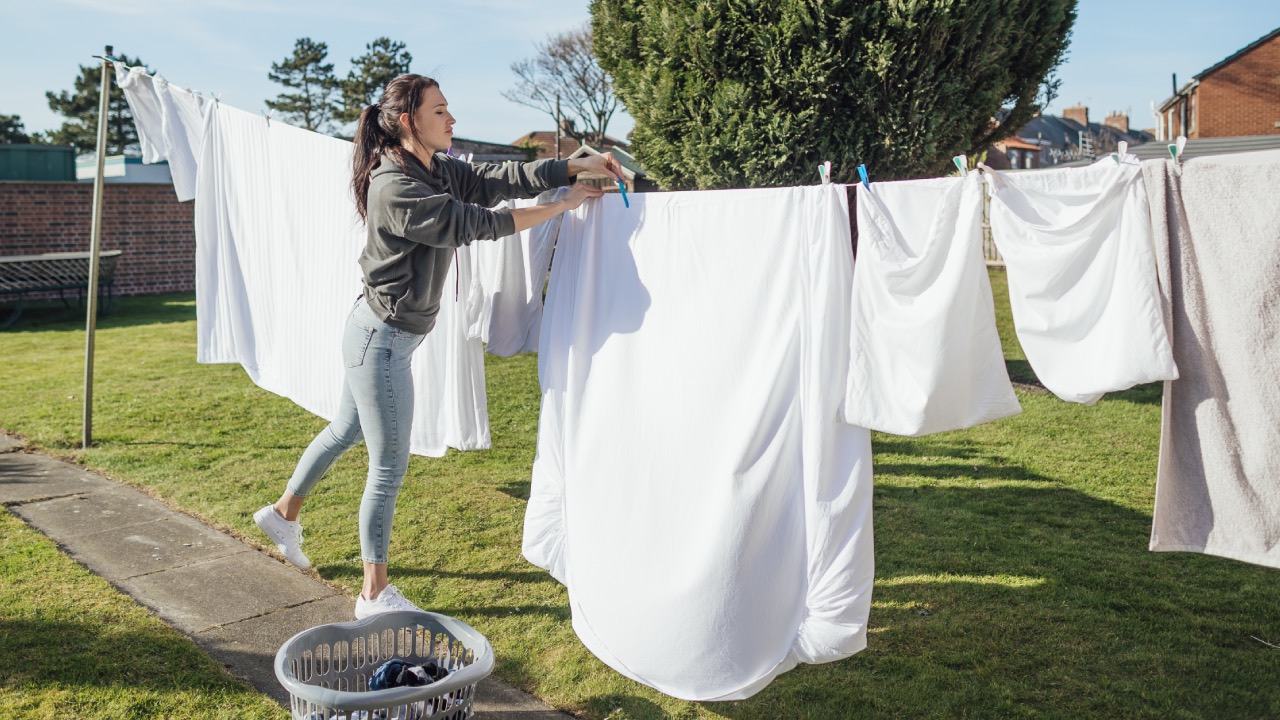How often should you wash your sheets?

Cleaning your sheets
How often should you wash your sheets? It may not be a question you ask yourself regularly. After all, unless you spill something on them or your pet has an accident, it’s easy to assume they’re clean and just get into bed. But, unfortunately, there’s a lot lying on those sheets besides you.
We spend upwards of 60 hours a week on our sheets, according to Annette Grant and Sarah Karakaian, full-time short-term rental managers and hosts of the Thanks for Visiting podcast. “If you think of it like wearing the same t-shirt or pants for 60 hours a week, laundering your sheets more often doesn’t seem like such a tall order. Caring for your bedding can directly affect your health and the quality of your sleep,” they say.
How often should you wash your sheets?
“Washing once a week is best,” says lifestyle expert Cheryl Nelson. “But definitely wash sheets AT LEAST once every two weeks. That’s the maximum amount of time you should go. You’re washing off germs, sweat, saliva, body oils, allergens, pollen, makeup residue, dead skin cells, pet dander, dust mites, bacteria, fungi, and even bodily fluids/faecal matter, all of which can cause health problems.”
What happens if you don’t wash your sheets often enough? “More exposure to pollen, pet dander, fungi, etc can worsen allergy and asthma symptoms,” Nelson points out. “Dirty sheets can also cause contact dermatitis or trigger eczema.”
Some people may need to wash their sheets more often
How often you should wash your sheets depends on your body and lifestyle. Nelson suggests you wash your sheets every few days if you:
- Suffer from allergies or asthma
- Sweat excessively
- Eat in bed
- Let your pets sleep in your bed
- Have an infection or lesion on your body
- Sleep naked
- Don’t shower before getting into bed
All of these factors make it more likely that you’ll have some kind of negative reaction if you don’t wash your sheets regularly.
Why it's important to wash your sheets regularly
Because your skin comes in direct contact with them for so many hours, some of the negative reactions you can have to dirty sheets include:
- Skin irritations
- Acne
- Eczema
- Allergies
- Infections
However, you can rest assured that you will not get bed bugs from dirty sheets. “Bed bugs have nothing to do with cleanliness,” explains Nelson. “They ‘hitchhike’ a ride on other items brought in from outside, like luggage, bags, and shoes.”
How often should you buy new sheets
According to Grant and Karakaian, the quality of your sheets will directly affect how long they last. “Sheets made of higher-end cotton are more durable and can last up to four to five years,” they say, “but the average polyester sheet will start to break down after two or three years.”
Some of the signs that you need to invest in new sheets include pilling, tearing, thinning, and stretching. If your sheets have stains that can’t be removed, they don’t smell as fresh after washing anymore, or they just don’t feel as good against your skin, toss them. Depending on your preferences, consider buying a set of cooling sheets or some cosy flannel sheets for a good night’s sleep.
“If you really hate doing laundry, we recommend having extra sheets on hand,” say Grant and Karakaian. “That way, you can still change your sheets every week but you don’t have to wash them as often.”
Should you wash brand-new sheets?
“Yes!” says Nelson. “Sheets are often made with chemicals and dyes that can irritate skin, eyes, and airways – especially if you have allergies or sensitive skin. I always wash sheets first with a hypoallergenic and fragrance-free laundry detergent to ensure they’re clean.”
How to wash sheets
Even if you know how to do laundry, you’ll want to know how to choose the best washing machine temperature and how to choose the best dryer setting for getting your sheets their cleanest. Here’s a step by step guide to washing your sheets, according to Grant and Karakaian, who, as full-time short-term rental managers, have perfected the process.
- Check the instructions and laundry symbols on the care tags before doing anything.
- Pretreat any stains by soaking in your desired stain remover in it for an hour.
- Unless otherwise noted on the care instructions, select the normal cycle on your washing machine and opt for warm water.
- When the wash cycle is complete, remove the sheets and hang them on the line or toss them into your dryer. If using a dryer, hoose the permanent press setting if your machine offers it. This will allow sheets to continue tumbling after the cycle is through until you’re ready to remove them. If your machine doesn’t offer permanent press, select the medium or warm setting. Do not dry your sheets on high! Doing so will significantly cut the lifespan of your sheets.
- Remove sheets from the dryer just before they’re completely dry. Place your sheet on the bed and smooth out with your hand.
- When folding bedding to be stored, keep an iron and ironing board close by. Fold the sheets into thirds, then take a warm iron and run it over the folded sheets. Fold them again and take the warm iron to them one more time before storing. When you pull them out to make the bed, they’ll be fresh and crisp
Image credits: Getty Images
This article originally appeared on Reader's Digest.
